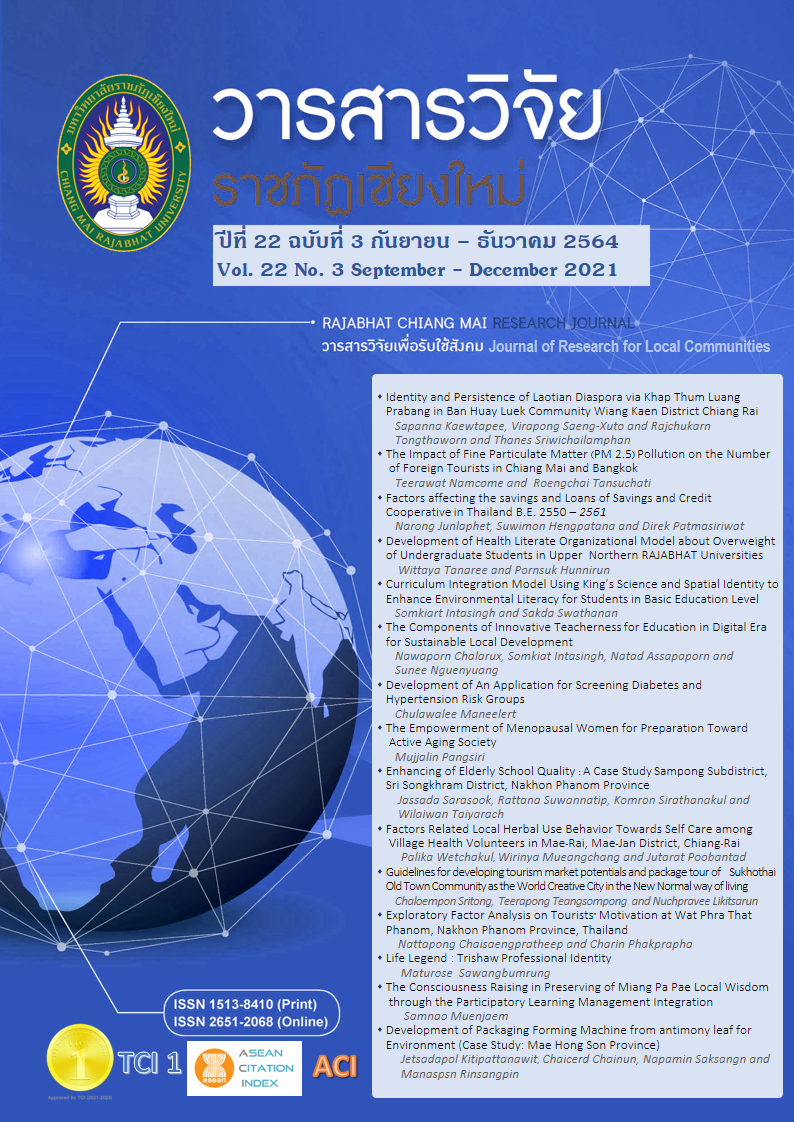Factors Related Local Herbal Use Behavior Towards Self Care among Village Health Volunteers in Mae-Rai, Mae-Jan District, Chiang-Rai
DOI:
https://doi.org/10.14456/rcmrj.2021.247231Keywords:
Behavior of using medicinal plants, Health volunteers, Self-careAbstract
A descriptive cross - sectional study aimed to survey factors related with people’s behavior towards self-care among village health volunteers and study to survey factors related with to leading factors, supporting factors and auxiliary factor with the relationship of personal factors of the daily use of herbs of among village health volunteers in Mae-Rai, Mae-Jan district, Chiang-Rai. The data was collected between August and September, 2020 and used questionnaire for to collect data. The data were collected by using a questionnaire that was validated for the research tool's validity from experts in the amount of 3 people. Totally, 154 health volunteers were selected. Descriptive statistics and analysis statics using Fisher’s exact test and Peason’s Product Moment Correlation Coefficent were applied for statistical analysis.
A result of the survey results shows that the predisposing factors for work experience of health volunteers were different correlated with the behavior of using traditional herbs in health care statistical significance of difference at .05. The supporting factors to the acquisition of traditional herbs for self-care of health volunteers had a moderately relationship. Statistically significant at .05 (r = .473) and the auxiliary factor to receiving information on the use of traditional medicinal plants in self-care of the volunteers. Mae Rai sub-district had a moderately relationship Statistically significant at .05 (r = .534) The study suggested that an information from studies applied to promote health volunteers about proper use and safety of herbal medicines in healthcare. If volunteers can use herbal medicine properly, they will be able to distribute the knowledge on herbal medicine to the community.
Downloads
References
Anekpunyakul, P., Sirilak, S., & Damee, P. (2020). Herbal Use Behavior in Health Care among the People in ReceivingService at Naresuan University Hospital. Council of University Administrative Staff of Thailand Journal, 9(2). 76 – 90. http://www.council-uast.com/journal/index.php (In Thai)
Aphin, C. (2011). Organizational support related to proactive health promotion activities of village health volunteers in Nakhu District, Kalasin Province. (Master degree, Khon Kaen University). (In Thai)
Buddalerd, P. (2018). The study of the use of local herbs for product development to be used in Thai spa by village health volunteer community group: Thanon Pho sub-district, Non Thai district, Nakornratchasrima province. SUTHIPARITHAT, 32(104), 83-98. https://so05.tci-ะhaijo.org/index.php/DPUSuthiparithatJournal/article/view/243412 (In Thai)
Chanada, R. (2006). Participation of Health Volunteers in Health Promotion of Community :Case Study of Pathuman District, Bangkok Metropolis. (Master degree,Thammasat University) (In Thai)
Hemtrakoonwon R., Nawsuwan K., & Ployninpeach, J. (2020). Behaviors of Using Herbs for Primary Health Care of Population in Yala City Municipality, Meuang District, Yala Province. The 11th Hatyai National and International Conference. Songkla.
Herbal Products Division. (2019). Herbal Products Act. 2019. Retrieved from https://www.fda.moph.go.th/Herbal/SitePages/law_herbal2.html (In Thai)
Jaruwan, S., & Pilaiwan, L. (2007). Factors Affecting People Consumption of Herbal Decoction Ban Cok-Klai, Muang Lai subdistrict,Mueang District, Sakon Nakhon Province. (Master degree, Sakon Nakhon Rajabhat University). (In Thai)
Mattavangkul, C., Kawitu, K., Deenoo, S., & Sinwannakool S. (2019). Factor Related to Herbal Use Behxy00ypavior for Self-care among Peoplein Phasi-Chareon District. Journal of Nursing, Siam University, 20(39), 99-109. https://he01.tci-thaijo.org/index.php/nursingsiamjournal/article/view/220474 (In Thai)
National Health Commission: NHC Version 12 Ministry of Public Health. (2019). Retrieved from http://www.rh2.go.th/uploads/documents/wg1/20160919_131547_18_9911.pdf (In Thai)
Nawarat, Y. (2012). Behavior of eating herbal medicine in self-care of patients at the dispensary, Khao Chamao Hospital, Chalermprakiet 80th Anniversary. (Bachelor of degree, Mahidol University). (In Thai)
Patcharin, S. (2004). Participation in healthy Thailand project of public health volunteers, district of bo phloi, Kanchanaburi province. (Master degree, Silpakorn University). (In Thai)
Phatnaree, R. (2007). Roles performance of public health volunteers compared with individual character factors of Tha Mai District, Chanthaburi Province. (Master degree, Khon Kaen University). (In Thai)
Phdthapee, J., & Prasertsuk, N. (2015). Health Promotion Behavior For People Operated By Village Health Volunteers In District of Boploi, Kanchanaburi Province. Veridian E-Journal,Silpakorn University, 9(3), 1190-1205. https://he02.tci-thaijo.org/index.php/Veridian-E-Journal/article/view/75662 (In Thai)
Pimpa, R., Therawiwat, M,.Mamee, N., & Tansakul, S. (2003). Herbal Using Behaviors among Diabetes, Kanchanaburi Province. Journal of Boromarajonani College of Nursing, 30(3), 14-25. https://he01.tci-thaijo.org/index.php/bcnbangkok/article/view/30253 (In Thai)
Unjana, R., & Leemingsawat, W. (2016). Knowledge, attitude and behaveior of using alternative medicine in Thai people. Journal of Sports Science and Health, 17(2), 70-83. https://he02.tci-thaijo.org/index.php/spsc_journal/issue/view/16545/3845 (In Thai)
Wirinya, M. (2016). Factors Related to Self Treatment with Herbal Remedies of People in Mea Chai District, Phayao Province. (Master degree, Thummasat University). (In Thai)
Woradet, S., Chaimay, B., Salaea, R., &Kongme, Y. (2015). Factors Associated with Herbal Used Behavior towards Self Care among Village Health Volunteers inKrung La District, Phatthalung Province. Journal of Health Science, 24(1), 50-59. https://thaidj.org/index.php/JHS/article/view/416 (In Thai)
Downloads
Published
How to Cite
Issue
Section
License
1. Articles, information, content, images, etc published in the “Community and Social Development Journal” are copyrighted by the Community and Social Development Journal, Chiang Mai Rajabhat University. In order to properly distribute the articles through print and electronic media, the authors still hold the copyright for the published articles under the Creative Commons Attribution (CC BY) license, which allows the re-distribution of the articles in other sources. References must be made to the articles in the journal. The authors are responsible for requesting permission to reproduce copyrighted content from other sources.
2. The content of the articles appearing in the journal is the direct responsibility of the article authors. The editorial board of the journal does not necessarily agree with or share any responsibility.














